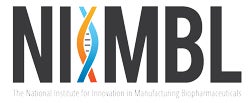CBIS is a Tier 1 member of The National Institute for Innovation in Manufacturing Biopharmaceuticals (NIIMBL), whose mission is to accelerate biopharmaceutical manufacturing innovation. The goal is to cost-effectively produce stable biologics capable of safely preventing and treating and pandemic diseases, cancer, diabetes, autoimmune disorders, and bacterial and viral infections.

NIIMBL funds innovative research initiatives, develops standards, and cultivates workforce training. “New manufacturing technologies are crucial to bringing safe, life-saving treatments to patients faster and, now more than ever, the biopharma industry, is seeing an increased demand for skilled talent,” states Kelvin H. Lee, Institute Director, adding, “NIIMBL is strategically positioned to bring forth collaborative innovation to meet the growing needs of the industry through our industry, academic and government stakeholders.”
Through numerous NIIMBL awards, Rensselaer researchers and academicians are making significant contributions to overcome hurtles in the manufacture of next-generation drug therapies.
“We are at the cutting edge of critical technical and workforce development solutions, and plan to stay there” noted Jason Davis, director of operations and business development for the Shirley Ann Jackson, Ph.D. Center for Biotechnology and Interdisciplinary Studies. “RPI has demonstrated leadership in both areas with eight projects awarded to date, and an impressive range of partners from industry and academia.”
Funded Projects
CBIS is proud to be spearheading ongoing participation in eight initiatives at Rensselaer, including two announced in May 2020 as part of a new wave of funded research programs.
© 2020 NIIMBL. These projects were developed with an award from the National Institute for Innovation in Manufacturing Biopharmaceuticals (NIIMBL) and financial assistance from the U.S. Department of Commerce, National Institute of Standards and Technology (70NANB17H002).
Our technology is leading the way to an advanced cell separation process to produce mass quantities of target proteins. This is a major technical challenge in the decade-long effort to cost-effectively manufacture these complex, protein-based biologics. Our research teams have developed an upstream chemical synthesis process to culture and produce cells with the purity to enable elemental characterization of a protein of interest. Producing cells in sufficient quantities to create healthy proteins from a variety of raw cellular material is a key challenge for efficacy of biopharmaceutical manufacturing.
- Rensselaer Polytechnic Institute
- MilliporeSigma/EMD Serono
The goal of this project is to develop and pilot a hybrid industry-academia training model for new and incumbent employees that can be used as a framework similar programs on the regional and national level. This effort will focus on directly bridging the gap between academic and industry training using a shared ownership model that connects content and outcomes. This will result in co-creation of digital, classroom and hands-on content, as well as shared content delivery across physical locations with both industry and academic instructors.
- North Carolina State University
- Rensselaer Polytechnic Institute
- LigaTrap Technologies, LLC.
- Merck & Co., Inc.
- MilliporeSigma/EMD Serono
This project will develop a single-use cartridge adsorbent for the capture of monoclonal antibody fragments and residual host cell proteins (HCPs) from Protein A-eluates in flow through mode. Owing to the low cost of materials, the cartridge is disposable and the packed adsorbent recyclable and “green”. This technology complements an adsorbent for the removal of HCPs from CHO cell culture fluids from a previous NIIMBL project, supports continuous downstream bioprocessing, and reduces process footprint, costs, and time to market.
- University of Delaware
- Genentech
- Merck
- North Carolina State University
- Rensselaer Polytechnic Institute
- Repligen Corporation
The goal of this project is to develop a consistent, comprehensive approach to clear problematic HCPs in mAb biomanufacturing.
- Johns Hopkins University
- University of Massachusetts Medical School
- Artemis Biosystems Inc.
- Massachusetts Life Sciences Center
- Rensselaer Polytechnic Institute
- Repligen Corporation
- Unum Therapeutics Inc.
Upstream challenges will be addressed using high-throughput studies to optimize host cell growth and increase lentivirus production.
- Genentech
- ImmunoGen, Inc.
- Merck
- Rensselaer Polytechnic Institute
- Repligen Corporation
This project will address key gaps in the current downstream process development space by providing a mechanistic model and supporting laboratory workflows for accurately predicting challenging and complex chromatography applications, including multi-modal chromatography and separation of a range of product- and process-related impurities.
- Rensselaer Polytechnic Institute
- Bristol-Myers Squibb
- LumaCyte, LLC
The goal of this workforce development project is to develop a 3-day short course [link to Short Course subpage] targeting multiple levels of current and future workforce training needs. The course is designed to provide the fundamentals of two cell characterization technologies (flow cytometry, laser force cytology) in relation to cell therapy.
- Rensselaer Polytechnic Institute
- 908 Devices, Inc.
- AstraZeneca
- Carnegie Mellon University
- MilliporeSigma
- National Institute of Standards and Technology
While Antibody-Drug Conjugates (ADCs) are an important, growing class of anti-cancer drugs, they are dangerous to handle and require elaborate containment facilities, personnel protection devices, and cleaning protocols. This makes process development efforts expensive and limited in scope and restricts the ability for industry to train new professionals on proper handling of ADCs. This project will improve ADC process development efforts by identifying non-toxic molecules that mimic the chemical properties and processing behaviors of ADCs.
- Carnegie Mellon University
- MilliporeSigma
- Rensselaer Polytechnic Institute
The purpose of this project is to identify changes in miRNA and/or mRNA expression to more rapidly detect infection by adventitious agents. This method could save potential lost production time for manufacturers of biological therapeutics when a positive result is detected. The sooner adventitious agents are detected immediate corrective action can be taken to ensures product quality is not compromised and minimize or reduce further delays to final product release for more efficient accessibility to patients.

